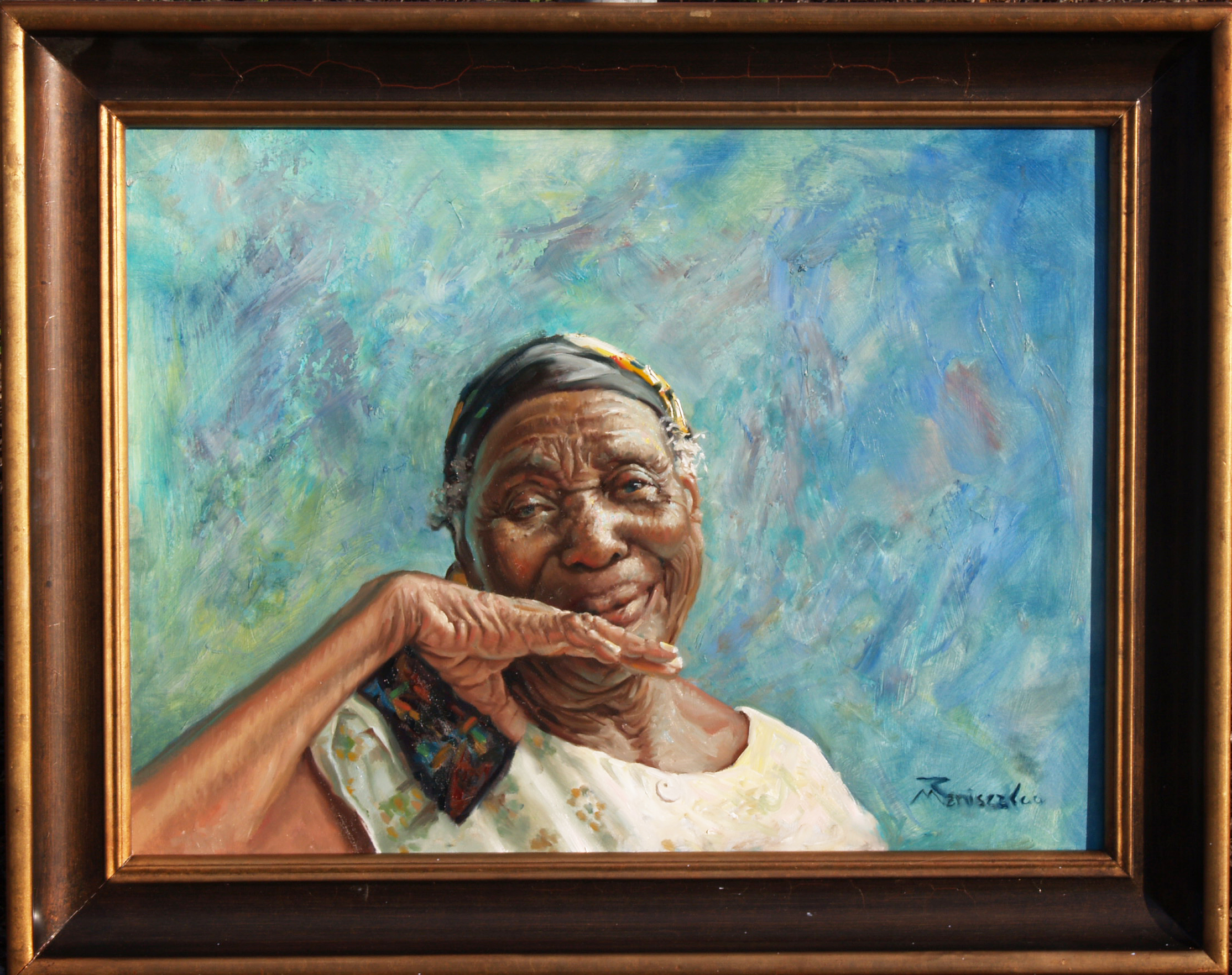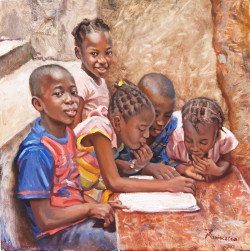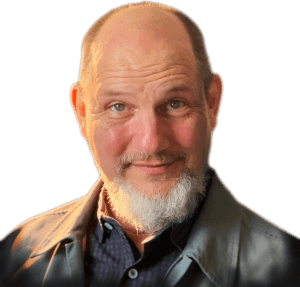From the upcoming Quench – reflections on God, art, water and equality by Robert Maniscalco
Pastor Medit Sanon runs the Bread of Life Missionary Orphanage, in Jacmel, Haiti. Julio and I are welcomed with warm embrace. No doubt, a hug is the best way to begin any great friendship. Clearly, this orphanage and the children in it, are very near and dear to Julio, who heads up the Watermissions presence in Haiti (WMI installs and maintains solar powered water filtration systems in remote areas around the world). I have the distinct sense, The Bread of Life orphans will soon be near and dear to my heart as well. There is a WMI water system installed on premises leaving them one less thing to worry about. Julio and his team are here to repair the system and the well. I’m here for something deeper.
The kids are everywhere, busy in classes every morning, doing chores in the afternoon and a healthy amount of play for the rest of the day. Everyone does their part. The children of The Bread of Life Orphanage are fortunate to have found one another. Lifelong bonds are being forged by these 21 brave children, made homeless by the Earthquake and Hurricane of 2010.
After days of ministering to the sick and injured who had been displaced by those back-to-back catastrophes, Pastor Medit, exhausted from his work, left the camp to find some much deserved rest. There, on the outskirts of the now infamous tent city, he found three children sitting in his car. Thus marked the beginning of his true calling. Without hesitation, he took in these beautiful children and began raising them to become the most loving, caring, dignified, generous people I would ever have the pleasure to know.
I was taken aback by Job and the other teenage boys, who seemed far more interested in taking care of my needs than seemed natural for that age. It didn’t line up with my image of the typical narcissistic teenagers I’ve experienced in the U.S. Here, there is none of the strife, selfishness or resentment one might find in a group of kids living in the U.S. The children range in age from about five to about 16. Everyone is gracious and joyful. None of the adults are yelling or having to ask anyone twice to do something.
I had to wonder, what was their secret to happiness? Is it their well-ordered existence? I see love demonstrated, everywhere. Why are they so empathetic? What is operating underneath that makes these kids different than mine, say, or any other typical American kids? I noticed they seem to be very grateful. They seem to feel blessed, or what a non-Christian might call lucky. They seem to appreciate that they have been afforded an opportunity others in Haiti have not. They feel cared for.
They feel they are being favored among their contemporaries, who they know are suffering, beyond these walls. And yet, they have been taught not to feel special or entitled. They do not just feel compassion, they act upon it in every moment. They would soon teach me the true meaning of wealth and the art of appreciation for whatever one has by the grace of God. And what do we truly have, after all the stuff has been stripped away? We have only each other. I was incredibly moved by the way the orphans take care of one another, the older children, teaching the younger. The Bread of Life is all about love and loyalty. They know how blessed they are and appreciate deeply every opportunity they have to learn and grow.
Job is tall and thin. As I was sketching Jasmin, he pulled my glasses up as they began to slip down my face. He saw how intent I was on my sketching so he wiped my brow and stinging eyes, where the sweat had mixed with bug spray. He sincerely cared about my comfort. This was perhaps a small gesture, but I cannot recall anyone ever showing me such selfless compassion.
He could see that sketching is a love language for me. Who doesn’t want to see what an artist sees in them?  I notice there is also much respect given to the adults, those on staff who cook and clean, as well as guests. Job leads the others by kind example, helping the sweat old Louise Noel, Medit’s aged mother, with her shoes. Soon, he and Ricardo, another amazing teenager, along with the others, will help me to see with more than just my eyes.
I notice there is also much respect given to the adults, those on staff who cook and clean, as well as guests. Job leads the others by kind example, helping the sweat old Louise Noel, Medit’s aged mother, with her shoes. Soon, he and Ricardo, another amazing teenager, along with the others, will help me to see with more than just my eyes.
Knowing how little money these 22 orphans are living on, and seeing how happy they are, it is clear that there is no real relationship between money and happiness. It might be easy to assume how incredibly grateful these children might be if they somehow magically found themselves in the land of plenty. And yet, I can’t help but wonder how profoundly their attitude might change if they were suddenly thrust into our American society of narcissism and immediate gratification.
In America, most kids take for granted, even feel entitled to having their own room, the latest electronics, eventually owning a car and getting a free ride to college. My deeply ingrained ethno-centric American perspective equates having more money with greater opportunity, success and happiness. In Haiti, I question the veracity of such a belief. I have serious doubts whether suddenly having more stuff would make these kids any happier or more fulfilled than they already are. I suspect it might ruin them. So the question isn’t whether adopting is practical or desirable but whether I actually have what it takes to continue building on the sense of gratefulness and feelings of favor these kids already possess. I wish I could say yes, but I’d be lying if I thought I could, with all the pressures they would face in America.
But let’s look a little deeper. What is it about Americans, who have so many resources, so much wealth potential and so many opportunities? Why are we so much more miserable and dissatisfied with our lives than the children I encountered at the Bread of Life? What I’ve found flies in the face of most self-help books, and many televangelists, who tell us to visualize the life we want to live. The American Dream promises success and happiness to anyone who works hard and perseveres. We are told to imagine abundance and wealth, pouring down upon us. When we truly do this, it will become manifested, the more we focus on the positive. Some religious leaders tell us to ask God for what we want and then expect the miracle. But is the God of the Universe really nothing but a short order cook, standing by to fulfill our every desire?
This is the great lie which leads to our societal angst. I realize this may sound like heresy to those who firmly believe in the Power of Positive Thinking, The Law of Attraction and The American Dream. But I believe the true optimist, the happiest and often most successful among us, are not focused on what they will have, but on what they do have. They are not waiting for something better to come along before seizing their bliss. They already have it. They do not hope, they live – in the present.
As we focus on what we want, we are secretly acknowledging the lack thereof. We are longing for the thing we are calling into being. We are focusing on a problem that can only be solved by getting what we are envisioning. We try to convince ourselves that our present reality is the illusion, and that God really wants us to have that which we desire. We convince ourselves we are deserving of more wealth, better friends, greater success and a thinner waistline. The list is endless. And so is the subsequent misery that comes when these things don’t materialize the way The Law of Attraction assures us they will. We tell ourselves, maybe I just didn’t believe hard enough. So we end up believing we are failures for not quite being positive enough.
As Christians, we throw the word “believe” around a lot. I will have used the word forty-seven times in this book. They say half the battle is believing. And they are right, if a battle is what you’re after. I have argued with many people who believe differently than I do. To believe is to invite an argument. There is a great big lie in the middle of the word beLIEve. I certainly have done my share of banging my head against the wall, believing I deserved more than I have. Then, when my dreams haven’t materialize the way I intended, it has left me more miserable than I was before I dared to hope.
It is our ego that tells us we are entitled to more than we have. “I deserve it. I have earned it. God wants me to have it.” It is our belief in this lie which keeps us in misery. Advertisers know this and use it quite effectively to sell us things we don’t need.
The children of Haiti are not caught up in this trap, laid by the ego. They know where they are and what is possible, recognizing and accepting the circumstances into which they have been born. We in the U.S. simply don’t believe in limitations of any kind. Does that make us a more optimistic, more proactive society? No, our ambitions only make us more miserable. We’re told from childhood that we can do or have anything if we want it badly enough. We are inundated with hope by the media and politicians. The Haitian boat people were motivated by hope, as are the hordes of illegal immigrants crossing the border from Mexico and Central America. Hoping and working for a better life can be a great motivator. But when it is accompanied by a belief that we are entitled to more, suffering is inevitable. Haitians take nothing for granted, mainly because they have no choice. So do we have a choice?
I’m not saying we shouldn’t aspire to a better life. After all, anything is possible. We must always be working toward improving our conditions and the conditions of others. But we will always be miserable when we make some future success or acquisition a condition for our happiness. This is called the idolatry of desire. It is far better to remain in a constant state of gratefulness, as we work passionately toward our goals. We must remain invested in the process, not the result. Our ability to gratefully accept what is happening in this moment is the key to happiness.
Like most people, I have found I’m much more effective in my work, when I am happy. As challenging as it may be to accept, we have exactly everything we need to bring us closer to God, right now. We may not have everything WE think we need or deserve, but God has His own plan for us. We may never know or understand what it is, in all its fullness, but we will be much happier, content in the knowledge that God indeed does have an amazing plan for us. We pray and listen for the quiet voice, not simply for God’s direction, but for the gentle assurance that we are a full participant in the greater plan God has for us. I know the small quiet voice of God can be pretty loud when a door is slamming in our face, but this is often the true nature of faith. It is how it differs from belief. Through faith, God accepts not only our praise and devotion but also our fears and doubts. Mother Teresa had the greatest faith of all, because she allowed herself to doubt, while remaining ever faithful. Real faithfulness is not dependent on a feeling for its existence.
______
Contact Robert or order your full color copy of Quench


 Would you like to get inspiration in your inbox, rather than ads for more stuff? Welcome to ManiscalcoGallery.com
Would you like to get inspiration in your inbox, rather than ads for more stuff? Welcome to ManiscalcoGallery.com
Stellar work there eveeoynr. I’ll keep on reading.